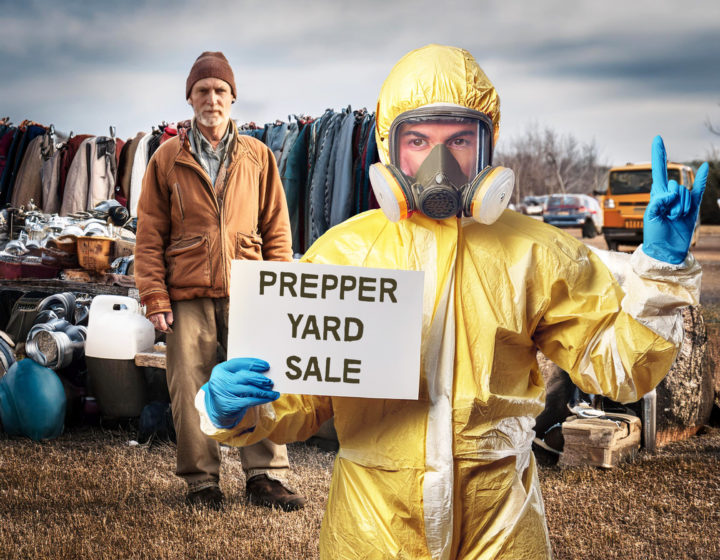Editor’s note: The following story is part of Xpress’ annual Humor Issue. None of the individuals reported on in the article are real. This is a satirical piece that is not meant to be taken seriously. Happy New Year.
The sun rises over Asheville, bathing the Blue Ridge Mountains in soft, renewing light. Birds, temporarily displaced by the storm, sing their gratitude for the steadfast trees that remain. Coffee shops, cautiously reopening, buzz with the tentative hum of conversation. For most residents, the aftermath of Tropical Storm Helene has been a slow but steady journey back to some semblance of normalcy — a painstaking reassembly of lives shaken but remarkably unbroken.
For the city’s robust community of doomsday preppers, however, the storm’s dissipation brought not relief — but crisis.
“Honestly, it’s been devastating,” says Buck Caldwell, founder of the Asheville chapter of Armageddon Associates, as he adjusts the solar panel on his custom-built apocalypse bunker. “I’ve spent 25 years preparing for the Big One — stockpiling freeze-dried lasagna, guns and water filtration systems. When the storm hit, I was ready. Oh boy, was I ever ready. But then … it ended. Far too soon, if you ask me.”
Caldwell pauses to pour himself a cup of coffee brewed with beans he hand-roasted over a propane flame. “What do I do now? Go back to my day job as a dental hygienist? It just feels … pointless. I hate teeth.”
For years, Asheville’s prepper community has thrived in the shadows, fortified by a shared commitment to self-sufficiency and an unwavering belief that society would collapse under the weight of its own hubris. Helene was supposed to be the cataclysmic event they’d all been waiting for.
It wasn’t.
The existential fallout
In the airy basement of a modest ranch home on the outskirts of West Asheville, Cheryl Turbidity-Smith sits cross-legged on a stack of MREs, leafing through a dog-eared copy of The Prepper’s Guide to Thriving After the End.
“Thriving after the end,” she scoffs. “What about thriving after not quite the end? Nobody writes books about that.”
Turbidity-Smith, who installed a Faraday cage to block electromagnetic fields in her backyard “just in case,” says she hasn’t slept well since the storm.
“My idiot husband keeps saying we dodged a bullet,” she explains, her voice tinged with bitterness. “But did we? Because now I’m stuck with 14 years’ worth of Spaghettios, and every time I crack one open, it feels like admitting defeat. We were supposed to take that bullet. That was our goddamn bullet.”
Turbidity-Smith has turned to the local prepper community for support, attending weekly potlucks where fellow preppers commiserate over postapocalyptic recipes like Why’d We Survive Casserole” and Prayin’ for Aliens Chili.
“We thought we’d be fighting off marauders by now,” she says. “Instead, we’re swapping tips for how to rotate our food stores so we don’t die of botulism. It’s goddamn depressing.”
A crisis of identity
Perhaps no one feels the sting of the unfulfilled apocalypse more acutely than Gary “Prepper Gary” LeClair, the host of a popular YouTube channel where he demonstrates survival techniques like how to build a solar-powered crossbow or craft artisanal jerky from car-flattened squirrels.
“I lost 3,000 subscribers after the hurricane,” LeClair tearfully confesses, his voice cracking. “People wanted action — fires, looting, fistfights — and all they got was strengthened community and a soggy Walmart.”
LeClair, who now livestreams himself “reintegrating into society,” says he’s been grappling with a profound sense of purposelessness.
“It’s like, who am I if the world isn’t ending?” he says, gesturing toward his collection of vacuum-sealed rice. “I used to have a mission. I was somebody. Now I’m just a guy with 319 unopened first-aid kits and no one to save.”
Still, LeClair is trying to stay optimistic. He recently launched a new series titled “Prepping for Post-Prep Life,” which includes episodes like “How to Turn Your Bunker into a Wine Cellar” and “Glass Blowing with Your Flame Thrower.”
Searching for a new apocalypse
Back at Armageddon Associates headquarters, Caldwell is brainstorming ways to keep his community engaged.
“We’re considering pivoting to other scenarios,” he says. “Nuclear war, alien invasion, maybe even AI uprising. The key is to stay flexible.”
But he admits it’s not the same.
“There was something special about Helene,” he says wistfully. “She had all the makings of a true end-times event: chaos, destruction, that feeling of impending doom. And then she just … fizzled. The economy tanked, sure. But people can breathe the air and not die. God, it’s like a Y2K rerun.”

For Caldwell, the fallout is personal. His bunker, once a sanctuary of purpose, now feels like a monument to dashed hopes.
“My wife suggested I convert it into a man cave,” he says, shaking his head. “A man cave. Like I’m going to put a foosball table next to the Geiger counter. Honestly, it’s insulting. She just doesn’t get it. I don’t love her anymore.”
The psychology of preparedness
Experts in the field of disaster psychology say the preppers’ plight is not uncommon.
“When someone spends years preparing for a worst-case scenario that doesn’t materialize, it can lead to a profound sense of loss,” explains Dr. Janet Mahoney, a psychologist specializing in existential crises. “They’ve built their entire identity around survival. When that identity is no longer relevant, it’s like a kind of mourning.”
Mahoney suggests that preppers could benefit from reframing their skills.
“Resilience isn’t just about surviving disasters,” she says. “It’s about adapting to life’s challenges, whether those challenges involve foraging for food in the wild or figuring out what to do with 400 pounds of powdered baby formula.”
A glimmer of hope
Despite the pervasive gloom, some preppers are finding ways to move forward.
Turbidity-Smith has started teaching workshops on “practical prepping” for everyday emergencies like power outages and snowstorms.
“It’s not the apocalypse,” she says, “but it’s something. And I’ve found that a lot of people are interested in learning how to pickle their own canned vegetables or make fire starters out of belly button lint. So that’s been nice.”
LeClair is even planning a community event — a Prepper Yard Sale — where locals can purchase surplus survival gear at a fraction of the cost.
“Do you know how many tactical flashlights I have?” he asks, laughing for the first time all afternoon. “Let’s just say no one in Asheville will ever be in the dark again. Except the liberals.”
Caldwell, meanwhile, is exploring the idea of a new hobby.
“I’ve been thinking about taking up bird-watching,” he says. “It’s kind of like prepping in a way. You have to be patient, observant and ready for anything. And it’s a great excuse to get out of the house, away from my wife.”
Asheville’s preppers may have lost their raison d’être, but Caldwell believes they’ll find a way forward.
“Survival isn’t just about stockpiling food or building bunkers,” he says, with a trace of his old fervor. “It’s about adapting. Even if that means surviving the one thing we never planned for: disappointment.”
For now, Asheville’s prepper community waits — watching, hoping and quietly rooting for the next big disaster. Because if there’s one thing they’ve learned, it’s this: the end of the world is a terrible thing to waste.




Before you comment
The comments section is here to provide a platform for civil dialogue on the issues we face together as a local community. Xpress is committed to offering this platform for all voices, but when the tone of the discussion gets nasty or strays off topic, we believe many people choose not to participate. Xpress editors are determined to moderate comments to ensure a constructive interchange is maintained. All comments judged not to be in keeping with the spirit of civil discourse will be removed and repeat violators will be banned. See here for our terms of service. Thank you for being part of this effort to promote respectful discussion.